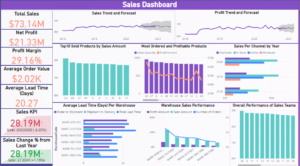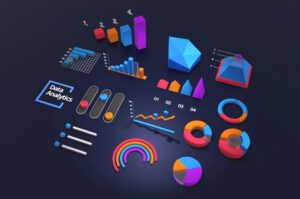Understanding the Basics of Data Science
Data science is an interdisciplinary field of study that involves using mathematical and statistical methods, algorithms, and computer programming to extract insights from structured and unstructured datasets. Data science also requires domain expertise to interpret and analyze large datasets facilitating data-driven decisions in various industries.
Data science has made a significant impact on today’s world. With the advancement of the latest technologies, companies or organizations are now allowed to vast amounts of data daily from users or customers. Effective analysis of these data helps to understand customer behavior, analyze market demands, keep up to date with the changing market trends, and react accordingly. Accurate and effective data analysis also helps organizations to develop strategic planning utilizing the collected data.
The data science career track involves diverse roles in different aspects of the data lifecycle. The primary role is data analyst which focuses on interpreting existing data to identify patterns and analyzing trends to support the decision-making process. A data scientist’s role is to deep dive into the data performing different statistical tests on the data, applying machine learning and deep learning techniques to build up predictive models utilizing the hidden patterns underlying complex data. On the other hand, Data Engineers are focused on maintaining data architecture ensuring stable, scalable data pipelines and efficient storage solutions.
As mentioned previously, data science is an interdisciplinary field and it requires skills in different fields such as advanced mathematical and statistical knowledge, programming skills, and domain knowledge, it is essential for anyone to acquire these skills if he/she is interested in building up a career path in data science. Programming languages such as R and Python are fundamental requirements to become a data scientist. These languages provide very useful libraries and tools ideal for data manipulation and analysis, which makes life a lot easier for people. The backbone of data interpretation and model creation comes from mathematical and statistical knowledge. An advanced level of knowledge in different topics like calculus, linear algebra, and probability theory is required to understand and develop predictive algorithms. Expertise in machine learning frameworks like TensorFlow and Scikit-Learn is critical for developing and deploying predictive models.
Data science is often considered a tool to solve problems in different domains. For example, a bank may intend to develop an automated system to detect which customer is more likely to default on the loan. A simple way is to develop a predictive algorithm to identify customers in two different classes – defaulter and non-defaulter and follow the necessary steps to develop the system they are looking for. But to develop such an algorithm and system, the importance of domain knowledge is very significant. Understanding the specific industry’s context where data science is applied enables professionals to pose the right equations and interpret the results meaningfully.
Educational Pathways and Skill Development
Data science, as a career, offers a diverse and flexible range of educational pathways. Degrees in computer science, statistics, mathematics, or related fields have been set as a standard route to becoming data science professionals. Students are equipped with fundamental knowledge in programming, mathematics, and statistical analysis by completing formal education in these fields. In recent times, many universities or colleges are offering programs in data science, data analysis, machine learning, and statistical analysis that allow students to get direct entry to become data science professionals.
Nowadays, many students completing a bachelor’s degree in different fields like engineering or other fields’ can also access their career into data science by completing necessary courses. There are numerous sources for online courses, boot camps, and certifications available. Some of the platforms like Coursera, edX, Udemy, DataCamp, etc are very popular among data science enthusiasts and they provide very high-quality lessons for learners to develop the knowledge required to become a data scientist in their career. Many online competitions are there as well which can enhance anyone’s knowledge significantly.
Data science is a very dynamic field of study that is evolving almost every day. To keep up-to-date with the most recent developments and industry trends in this field, learners should keep in touch with recent research, online forums, and communities like StackOverflow. These resources foster a deeper understanding of data science methodologies and encourage continuous learning, which is critical in this ever-evolving discipline.
Building a Strong Portfolio and Gaining Experience
A strong portfolio demonstrating proficiency, creativity, and practical experiences in dealing with real-world data is one of the very crucial steps for becoming a data science professional. A data science portfolio is not only used to showcase technical skills, but also it manifest one’s ability to derive insights and solve complex problems in various industries.
Contributing to open-source projects, and keeping up-to-date with the data science community is a valuable strategy to bolster portfolio. This not only augments one’s coding ability but also reflects commitment and dedication towards the field. Showcasing projects with a personal website or blog is a very good way to contribute to the community. Presenting projects in a structured and accessible manner and discussing methodologies, challenges, and learnings from the project can significantly enhance one’s profile. Platforms like GitHub, and Medium provide the opportunity to connect everyone with the open-source communities.
Navigating the Job Market and Continuous Learning
Starting a data science profession involves not just technical skills but also smart job market navigation. Tailoring your CV and LinkedIn profile is an important first step. Make sure your resume shows essential data science-related abilities and expertise, such as machine learning, statistical analysis, and data visualization tools. Your LinkedIn profile should reflect these components while highlighting your professional projects, publications, and any applicable certifications. Engaging with data science forums and contributing to discussions can also help you gain awareness with possible employers.
Another important factor is to be prepared for technical interviews. Data science interviews frequently incorporate coding problems, statistical theory, and case studies. Prepare by practicing common interview questions, working with real-world statistics, and brushing up on them.



